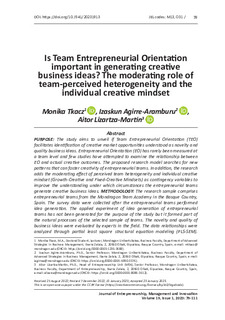| dc.rights.license | Attribution 4.0 International | * |
| dc.contributor.author | Tkacz, Monika | |
| dc.contributor.author | Agirre Aranburu, Izaskun | |
| dc.contributor.author | Lizartza-Martín, Aitor | |
| dc.date.accessioned | 2023-03-16T08:09:28Z | |
| dc.date.available | 2023-03-16T08:09:28Z | |
| dc.date.issued | 2023 | |
| dc.identifier.issn | 2299-7075 | en |
| dc.identifier.other | https://katalogoa.mondragon.edu/janium-bin/janium_login_opac.pl?find&ficha_no=171919 | en |
| dc.identifier.uri | https://hdl.handle.net/20.500.11984/6040 | |
| dc.description.abstract | PURPOSE: The study aims to unveil if Team Entrepreneurial Orientation (TEO) facilitates identification of creative market opportunities understood as novelty and quality business ideas. Entrepreneurial Orientation (EO) has rarely been measured at a team level and few studies have attempted to examine the relationship between EO and actual creative outcomes. The proposed research model searches for new patterns that can foster creativity of entrepreneurial teams. In addition, the research adds the moderating effect of perceived team heterogeneity and individual creative mindset (Growth-Creative and Fixed-Creative Mindsets) as contingency variables to improve the understanding under which circumstances the entrepreneurial teams generate creative business ideas. METHODOLOGY: The research sample comprises entrepreneurial teams from the Mondragon Team Academy in the Basque Country, Spain. The survey data were collected after the entrepreneurial teams performed idea generation. The applied experiment of idea generation of entrepreneurial teams has not been generated for the purpose of the study but it formed part of the natural processes of the selected sample of teams. The novelty and quality of business ideas were evaluated by experts in the field. The data relationships were analyzed through partial least square structural equation modeling (PLS-SEM). FINDINGS: Entrepreneurial Orientation of teams leads to product-market entries but not necessarily to novel product-market entries. Entrepreneurially oriented teams have a greater tendency to generate quality and slightly modified existing business ideas rather than to generate novel market opportunities. The applied moderators present different interaction results with the studied relationships. Specifically, individuals with a Fixed-Creative Mindset in a team have an antagonistic interaction on the TEO-Quality relationship. Team-Perceived Heterogeneity and Growth-Creative Mindset of individuals have no effect on either the TEO-Quality or the TEO-Novelty link. IMPLICATIONS: The research demonstrates the importance of contextualization of the nature of creativity in EO as a crucial antecedent of market innovations. Our study adds to the literature and practice by providing evidence that EO at a team level (TEO) plays a critical role in exploring product-market entries, given that TEO facilitates Quality outcomes only. Entrepreneurially oriented teams do not easily achieve Novel outcomes that allow them to enter new markets. Individuals with Fixed Creative Mindset in a team should be avoided as they block the relationship between Team Entrepreneurial Orientation and Quality. Likewise, our study supports the validity of Entrepreneurial Orientation at a team level, which can lead to more suitable practical implications for a team and its creativity management if applied. It could help in developing appropriate team formation and team management practices. ORIGINALITY AND VALUE: The study proposes rare and unique EO analysis at a team level and at young companies’ level (start-up). The study contributes to the original and overlooked in the literature conceptualization of EO within Schumpeter’s perspective of “creative destruction” in entrepreneurial activities. The examined theoretical foundations of EO led to clearer antecedents of behavioural effects of entrepreneurial teams towards product-market entries. The study initiates, identifies and calls for new further research lines to contribute to a greater and contingent understanding of how entrepreneurial teams generate creative business ideas, especially, novel business ideas, which are necessary for “creative destruction”, the EO construct itself and overall economic development. | en |
| dc.language.iso | eng | en |
| dc.publisher | Cognitione' Foundation for the Dissemination of Knowledge and Science | en |
| dc.rights | @ Los autores | en |
| dc.rights.uri | http://creativecommons.org/licenses/by/4.0/ | * |
| dc.subject | Emprendizaje | es |
| dc.subject | Creatividad en los negocios | es |
| dc.subject | Equipos de trabajo | es |
| dc.title | Is Team Entrepreneurial Orientation important in generating creative business ideas? The moderating role of team-perceived heterogeneity and the individual creative mindset | en |
| dc.type | http://purl.org/coar/resource_type/c_6501 | |
| dcterms.accessRights | http://purl.org/coar/access_right/c_abf2 | en |
| dcterms.source | Journal of Entrepreneurship, Management and Innovation | en |
| local.contributor.group | Transformación de modelos de negocio | es |
| local.contributor.group | Nuevos negocios | es |
| local.description.peerreviewed | true | en |
| local.description.publicationfirstpage | 79 | en |
| local.description.publicationlastpage | 111 | en |
| local.identifier.doi | DOI: https://doi.org/10.7341/20231913 | en |
| local.source.details | vol. 19, Issue 1 | en |
| oaire.format.mimetype | application/pdf | en |
| oaire.file | $DSPACE\assetstore | en |
| oaire.resourceType | http://purl.org/coar/resource_type/c_6501 | en |
| oaire.version | http://purl.org/coar/version/c_970fb48d4fbd8a85 | en |








